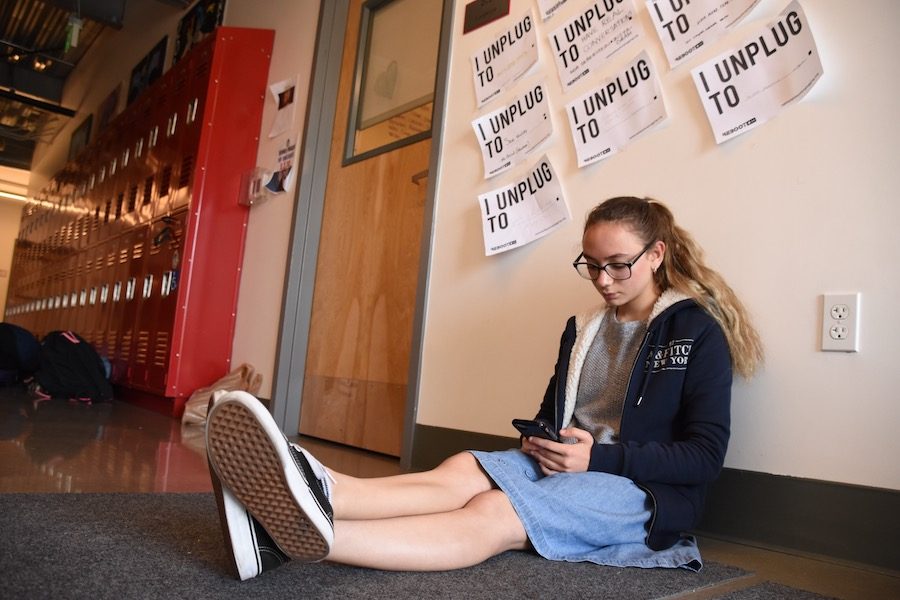Latest ‘cleanse’ is unplugging
Led by Ms. Crincoli’s ninth-grade English class, students try out cutting one app at a time
PHONE: Sophomore Shayna Schusterman shows social media is still alive and well in the second floor hallway. But some are opting in to get off of social media for while.
May 10, 2018
In a city that is full of people working to live healthier lifestyles, there’s nothing unusual about going on a cleanse.
Now some ninth-graders at Shalhevet are applying this method to their lives in social media.
The idea was inspired by a March class discussion following a journal prompt where the class discussed how addictive social media is. In response, the class created the social media cleanse as a way to relieve themselves of this pressure.
The rules for the cleanse were to delete one app of social media — not the account –` such as Snapchat, Instagram, and Facebook from their phones.
“The social media cleanse is a pledge to give up one social media app — not even all of them — just one for a set amount of time,” said English teacher Ms. Michelle Crincoli in an interview.
Each student chose one app to delete — ideally the most addictive one — on a Tuesday and was not to redownload it until Friday morning. Eighty-five percent of the class decided to take part.
The goal was simply to experience life more fully, and recognize the power each person gives to social media.
“At first I was hesitant to do it,” said freshman Noa Ablin, who gave up Snapchat. “It was really hard at the beginning, but then I found a lot of free time because all I normally do is scroll and scroll. Then, throughout the next week I totally forgot about it. I didn’t feel like I needed it anymore.”
But when she re-downloaded it, she resumed her normal social media habits, she said.
Another student of Ms. Crincoli, Layla Dauer, said that it was harder than she expected and she felt as if she was missing out on what her friends were doing and what was going on in the world. But she also said that it was refreshing to not be obsessed with knowing, and to just be present.
“I first thought the cleanse would be easy,” said Layla, “but it was much harder than I expected. I’m so used to automatically tapping on Instagram to see what’s going on with my friends outside of school and when I couldn’t, I felt like I was missing out. But, at the same time, it was refreshing.”
Social media cleanses have now become a cultural fad. Celebrities like Selena Gomez, Kendall Jenner and Justin Bieber have been known to go offline in order to live life without a screen.
Another example is that students delete social media during tense times in their high school or college careers — for finals week, SATs or college application season, for example.
“I found social media to be extremely distracting while studying and doing home- work,” said junior Jamie Berman who deleted social media on her own. “I weighed the benefits and detriments of using it at all, and decided it would be for the best to just delete Instagram and Facebook.”
According to British news source Express, researchers have found that reducing social media usage can help you sleep better.
“It’s proven that the blue light from phones and tablets wakes up the brain making it difficult to wind down and fall asleep,” the article says.
And of course, limiting social media usage may also force people to interact with other people in their lives, and actually diminish feelings of FOMO, the fear of missing out.













